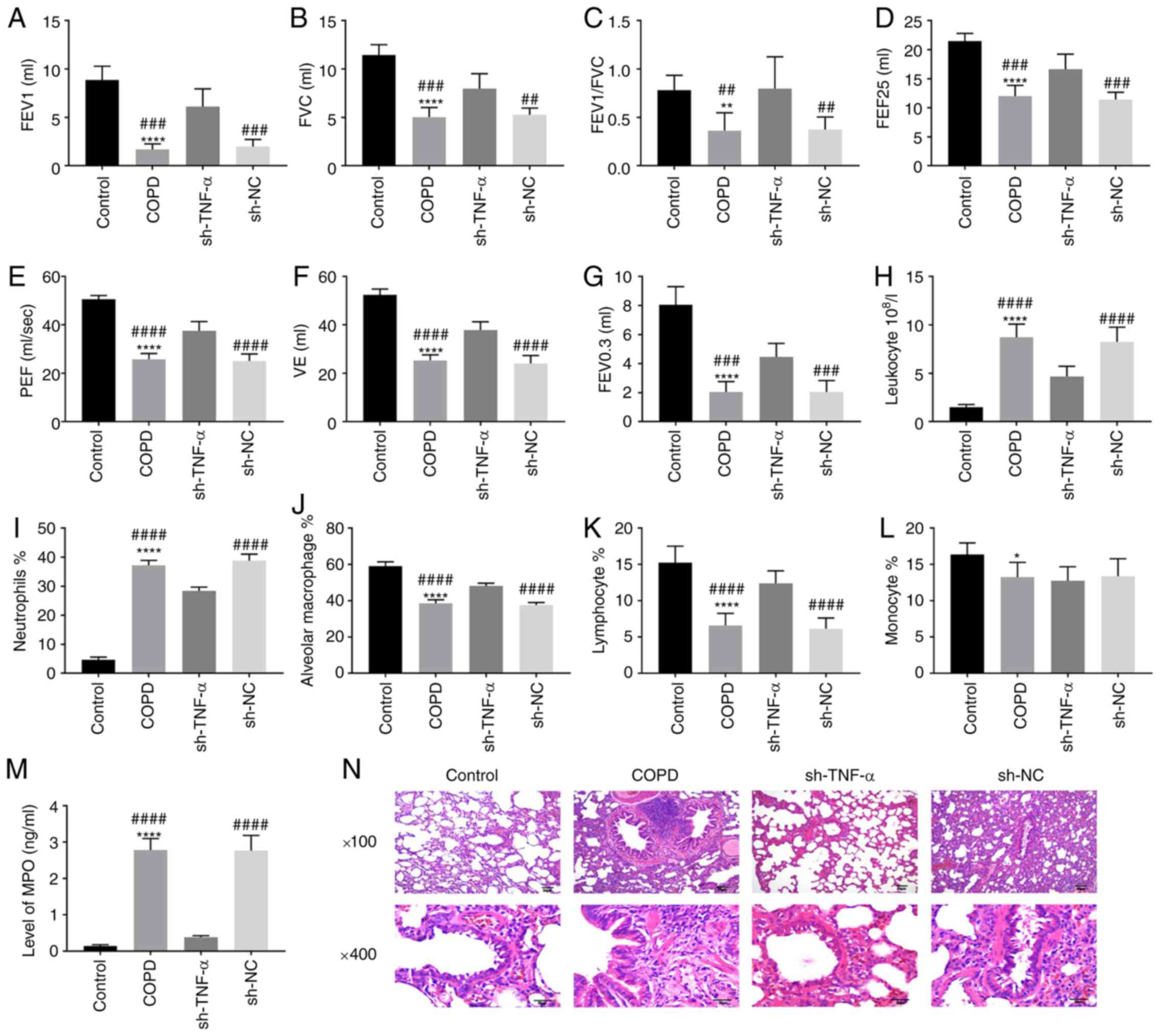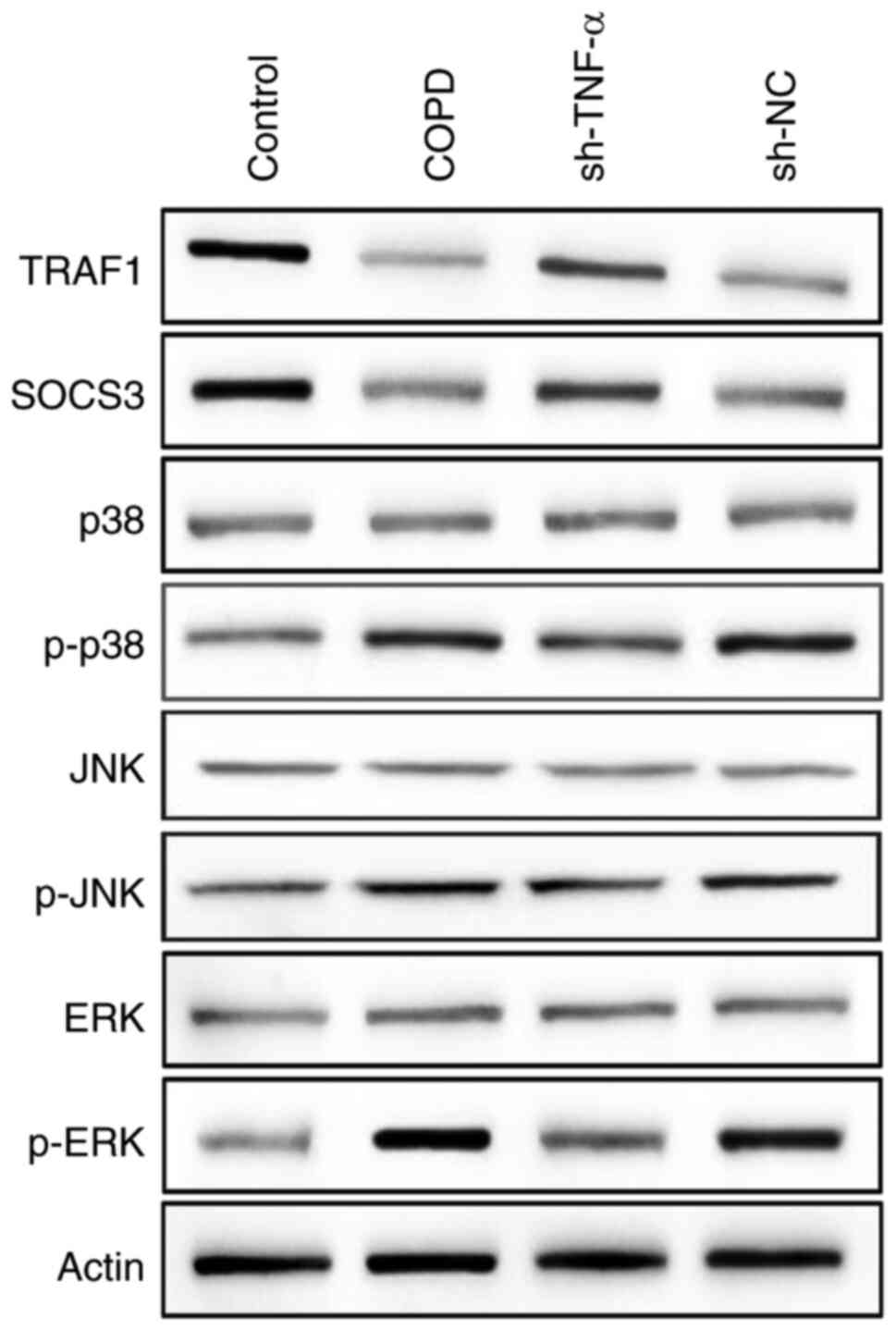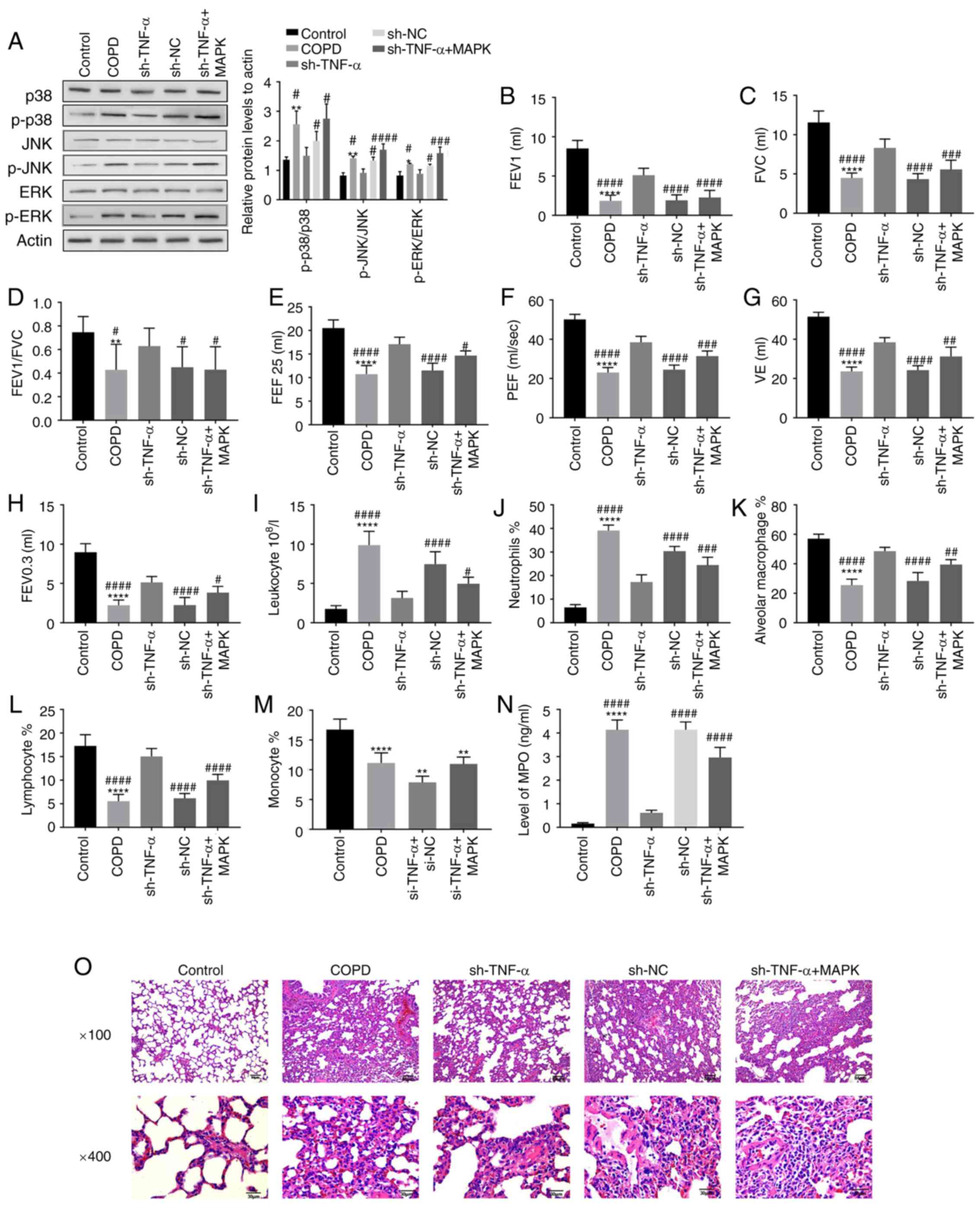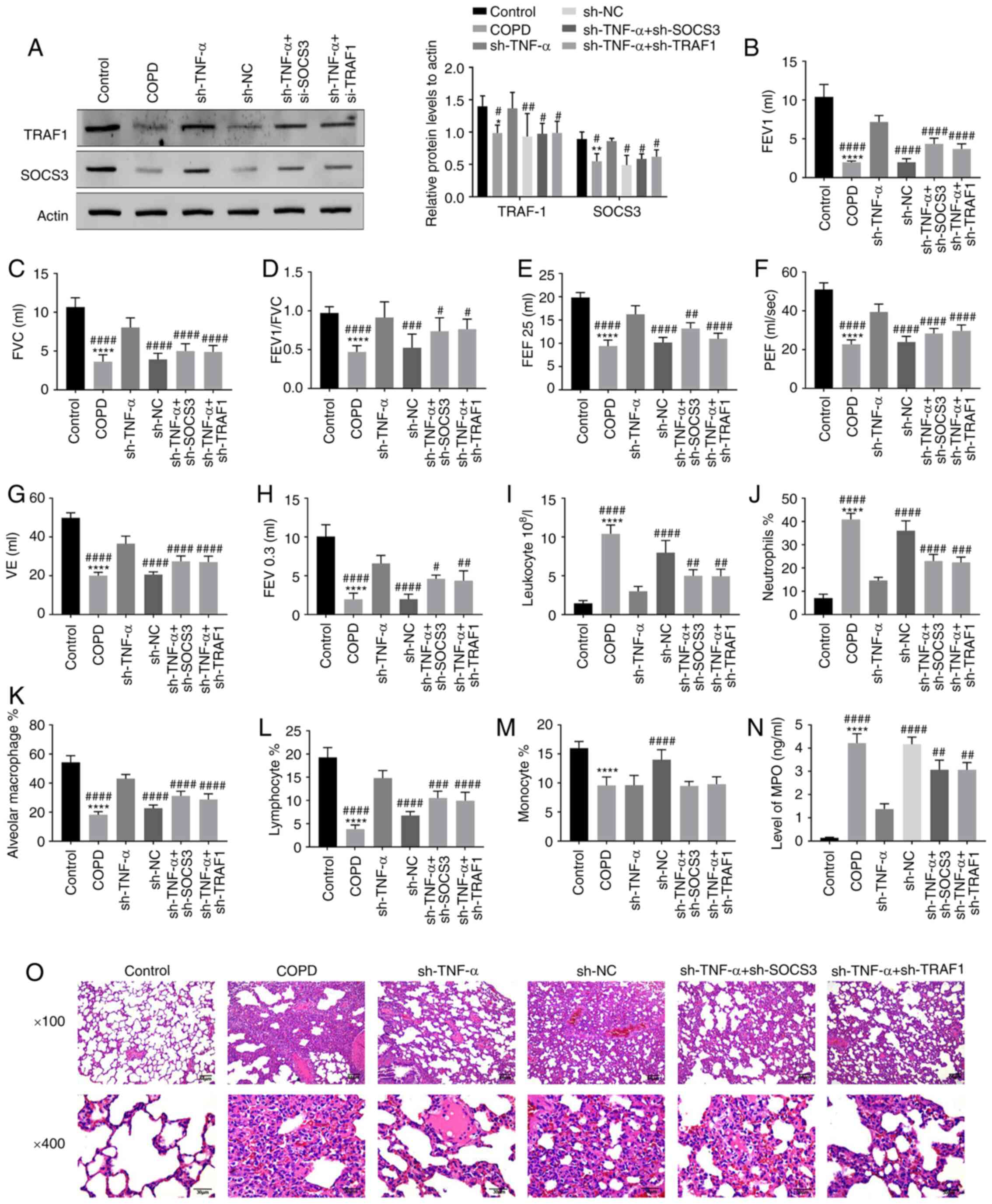|
1
|
Sun X, Dong Z, Li N, Feng X, Liu Y, Li A,
Zhu X, Li C and Zhao Z: Nucleosides isolated from Ophiocordyceps
sinensis inhibit cigarette smoke extract-induced inflammation via
the SIRT1-nuclear factor-κB/p65 pathway in RAW264.7 macrophages and
in COPD mice. Int J Chron Obstruct Pulmon Dis. 13:2821–2832.
2018.PubMed/NCBI View Article : Google Scholar
|
|
2
|
Hoiland RL, Mladinov S, Barak OF, Willie
CK, Mijacika T, Stembridge M, Dujic Z and Ainslie PN: Oxygen
therapy improves cerebral oxygen delivery and neurovascular
function in hypoxaemic chronic obstructive pulmonary disease
patients. Exp Physiol. 103:1170–1177. 2018.PubMed/NCBI View
Article : Google Scholar
|
|
3
|
Kojima K, Asai K, Kubo H, Sugitani A,
Kyomoto Y, Okamoto A, Yamada K, Ijiri N, Watanabe T, Hirata K and
Kawaguchi T: Isoflavone aglycones attenuate cigarette smoke-induced
emphysema via suppression of neutrophilic inflammation in a COPD
murine model. Nutrients. 11(2023)2019.PubMed/NCBI View Article : Google Scholar
|
|
4
|
Sun X, Feng X, Zheng D, Li A, Li C, Li S
and Zhao Z: Ergosterol attenuates cigarette smoke extract-induced
COPD by modulating inflammation, oxidative stress and apoptosis in
vitro and in vivo. Clin Sci (Lond). 133:1523–1536. 2019.PubMed/NCBI View Article : Google Scholar
|
|
5
|
Yipp BG, Petri B, Salina D, Jenne CN,
Scott BN, Zbytnuik LD, Pittman K, Asaduzzaman M, Wu K, Meijndert
HC, et al: Infection-induced NETosis is a dynamic process involving
neutrophil multitasking in vivo. Nat Med. 18:1386–1393.
2012.PubMed/NCBI View
Article : Google Scholar
|
|
6
|
Chen L, Sun BB, Wang T, Wang X, Li JQ,
Wang HX, Zhang SF, Liu DS, Liu L, Xu D, et al: Cigarette smoke
enhances {beta}-defensin 2 expression in rat airways via nuclear
factor-{kappa}B activation. Eur Respir J. 36:638–645.
2010.PubMed/NCBI View Article : Google Scholar
|
|
7
|
Son ES, Kim SH, Ryter SW, Yeo EJ, Kyung
SY, Kim YJ, Jeong SH, Lee CS and Park JW: Quercetogetin protects
against cigarette smoke extract-induced apoptosis in epithelial
cells by inhibiting mitophagy. Toxicol In Vitro. 48:170–178.
2018.PubMed/NCBI View Article : Google Scholar
|
|
8
|
Bhalla DK, Hirata F, Rishi AK and Gairola
CG: Cigarette smoke, inflammation, and lung injury: A mechanistic
perspective. J Toxicol Environ Health B, Criti Rev. 12:45–64.
2009.PubMed/NCBI View Article : Google Scholar
|
|
9
|
Barnes PJ: New anti-inflammatory targets
for chronic obstructive pulmonary disease. Nat Rev Drug discov.
12:543–559. 2013.PubMed/NCBI View
Article : Google Scholar
|
|
10
|
Beaudin AE, Hartmann SE, Pun M and Poulin
MJ: Human cerebral blood flow control during hypoxia: Focus on
chronic pulmonary obstructive disease and obstructive sleep apnea.
J Appl Physiol (1985). 123:1350–1361. 2017.PubMed/NCBI View Article : Google Scholar
|
|
11
|
Portegies ML, Lahousse L, Joos GF, Hofman
A, Koudstaal PJ, Stricker BH, Brusselle GG and Ikram MA: Chronic
obstructive pulmonary disease and the risk of stroke. Am J Respir
Crit Care Med. 193:251–258. 2016.PubMed/NCBI View Article : Google Scholar
|
|
12
|
Criner GJ, Bourbeau J, Diekemper RL,
Ouellette DR, Goodridge D, Hernandez P, Curren K, Balter MS,
Bhutani M, Camp PG, et al: Prevention of acute exacerbations of
COPD: American college of chest physicians and canadian thoracic
society guideline. Chest. 147:894–942. 2015.PubMed/NCBI View Article : Google Scholar
|
|
13
|
Salimi Asl M, Ahmadi A, Salimian J,
Shohani S, Azimzadeh Jamalkandi S and Ghanei M: TNF-α-308 G/A
variant and susceptibility to chronic obstructive pulmonary
disease: A systematic review and meta-analysis. Cytokine.
123(154763)2019.PubMed/NCBI View Article : Google Scholar
|
|
14
|
Aggarwal BB and Natarajan K: Tumor
necrosis factors: Developments during the last decade. Eur Cytokine
Netw. 7:93–124. 1996.PubMed/NCBI
|
|
15
|
Yao Y, Zhou J, Diao X and Wang S:
Association between tumor necrosis factor-alpha and chronic
obstructive pulmonary disease: A systematic review and
meta-analysis. Ther Adv Respir Dis.
13(1753466619866096)2019.PubMed/NCBI View Article : Google Scholar
|
|
16
|
Lundblad LK, Thompson-Figueroa J, Leclair
T, Sullivan MJ, Poynter ME, Irvin CG and Bates JH: Tumor necrosis
factor-alpha overexpression in lung disease: A single cause behind
a complex phenotype. Am J Respir Crit Care Med. 171:1363–1370.
2005.PubMed/NCBI View Article : Google Scholar
|
|
17
|
Vuillemenot BR, Rodriguez JF and Hoyle GW:
Lymphoid tissue and emphysema in the lungs of transgenic mice
inducibly expressing tumor necrosis factor-alpha. Am J Respir Cell
Mol Biol. 30:438–448. 2004.PubMed/NCBI View Article : Google Scholar
|
|
18
|
Churg A, Wang RD, Tai H, Wang X, Xie C and
Wright JL: Tumor necrosis factor-alpha drives 70% of cigarette
smoke-induced emphysema in the mouse. Am J Respir Crit Care Med.
170:492–498. 2004.PubMed/NCBI View Article : Google Scholar
|
|
19
|
Kochetkova EA, Nevzorova VA, Ugai LG,
Maistrovskaia YV and Massard G: The role of tumor necrosis factor
Alpha and TNF superfamily members in bone damage in patients with
end-stage chronic obstructive lung disease prior to lung
transplantation. Calcif Tissue Int. 99:578–587. 2016.PubMed/NCBI View Article : Google Scholar
|
|
20
|
Matera MG, Calzetta L and Cazzola M:
TNF-alpha inhibitors in asthma and COPD: We must not throw the baby
out with the bath water. Pulm Pharmacol Ther. 23:121–128.
2010.PubMed/NCBI View Article : Google Scholar
|
|
21
|
Zhang S, Wang C, Xi B and Li X:
Association between the tumour necrosis factor-α-308G/A
polymorphism and chronic obstructive pulmonary disease: An update.
Respirology. 16:107–115. 2011.PubMed/NCBI View Article : Google Scholar
|
|
22
|
Li A, Liu Y, Zhu X, Sun X, Feng X, Li D,
Zhang J, Zhu M and Zhao Z: Protective effect of methylallyl sulfone
in the development of cigarette smoke extract-induced apoptosis in
rats and HFL-1 cells. Biochem Biophys Res Commun. 498:627–632.
2018.PubMed/NCBI View Article : Google Scholar
|
|
23
|
Vogelmeier CF, Criner GJ, Martinez FJ,
Anzueto A, Barnes PJ, Bourbeau J, Celli BR, Chen R, Decramer M,
Fabbri LM, et al: Erratum to ‘Global strategy for the diagnosis,
management, and prevention of chronic obstructive lung disease 2017
report: GOLD executive summary’ [Arch Bronconeumol.
2017;53:128-149]. Arch Bronconeumol. 53:411–412. 2017.PubMed/NCBI View Article : Google Scholar : (In English,
Spanish).
|
|
24
|
Tsai MJ, Chang WA, Jian SF, Chang KF, Sheu
CC and Kuo PL: Possible mechanisms mediating apoptosis of bronchial
epithelial cells in chronic obstructive pulmonary disease-A
next-generation sequencing approach. Pathol Res Pract.
214:1489–1496. 2018.PubMed/NCBI View Article : Google Scholar
|
|
25
|
Yang IA, Brown JL, George J, Jenkins S,
McDonald CF, McDonald VM, Phillips K, Smith BJ, Zwar NA and
Dabscheck E: COPD-X australian and New Zealand guidelines for the
diagnosis and management of chronic obstructive pulmonary disease:
2017 update. Med J Aust. 207:436–442. 2017.PubMed/NCBI View Article : Google Scholar
|
|
26
|
Yao Y, Zhou J, Diao X and Wang S:
Association between tumor necrosis factor-α and chronic obstructive
pulmonary disease: A systematic review and meta-analysis. Ther Adv
Respir Dis. 13(1753466619866096)2019.PubMed/NCBI View Article : Google Scholar
|
|
27
|
Chiang CH, Chuang CH and Liu SL:
Transforming growth factor-β1 and tumor necrosis factor-α are
associated with clinical severity and airflow limitation of COPD in
an additive manner. Lung. 192:95–102. 2014.PubMed/NCBI View Article : Google Scholar
|
|
28
|
Plomgaard P, Bouzakri K, Krogh-Madsen R,
Mittendorfer B, Zierath JR and Pedersen BK: Tumor necrosis
factor-alpha induces skeletal muscle insulin resistance in healthy
human subjects via inhibition of Akt substrate 160 phosphorylation.
Diabetes. 54:2939–2945. 2005.PubMed/NCBI View Article : Google Scholar
|
|
29
|
Chen NN, Wei F, Wang L, Cui S, Wan Y and
Liu S: Tumor necrosis factor alpha induces neural stem cell
apoptosis through activating p38 MAPK pathway. Neurochem Res.
41:3052–3062. 2016.PubMed/NCBI View Article : Google Scholar
|
|
30
|
Gaffey K, Reynolds S, Plumb J, Kaur M and
Singh D: Increased phosphorylated p38 mitogen-activated protein
kinase in COPD lungs. Eur Respir J. 42:28–41. 2013.PubMed/NCBI View Article : Google Scholar
|
|
31
|
Bosquet A, Girona J, Guaita-Esteruelas S,
Heras M, Saavedra-García P, Martínez-Micaelo N, Masana L and
Rodríguez-Calvo R: FABP4 inhibitor BMS309403 decreases
saturated-fatty-acid-induced endoplasmic reticulum
stress-associated inflammation in skeletal muscle by reducing p38
MAPK activation. Biochim Biophys Acta Mol Cell Biol Lipids.
1863:604–613. 2018.PubMed/NCBI View Article : Google Scholar
|
|
32
|
Armstrong J, Harbron C, Lea S, Booth G,
Cadden P, Wreggett KA and Singh D: Synergistic effects of p38
mitogen-activated protein kinase inhibition with a corticosteroid
in alveolar macrophages from patients with chronic obstructive
pulmonary disease. J Pharmacol Exp Ther. 338:732–740.
2011.PubMed/NCBI View Article : Google Scholar
|
|
33
|
Zhao X, Qi R, Sun C and Xie Y: Silencing
SOCS3 could inhibit TNF-α induced apoptosis in 3T3-L1 and mouse
preadipocytes. Mol Biol Rep. 39:8853–8860. 2012.PubMed/NCBI View Article : Google Scholar
|
|
34
|
Chhabra JK, Chattopadhyay B and Paul BN:
SOCS3 dictates the transition of divergent time-phased events in
granulocyte TNF-α signaling. Cell Mol Immunol. 11:105–106.
2014.PubMed/NCBI View Article : Google Scholar
|
|
35
|
Collins AS, Ahmed S, Napoletano S,
Schroeder M, Johnston JA, Hegarty JE, O'Farrelly C and Stevenson
NJ: Hepatitis C virus (HCV)-induced suppressor of cytokine
signaling (SOCS) 3 regulates proinflammatory TNF-α responses. J
Leukoc Biol. 96:255–263. 2014.PubMed/NCBI View Article : Google Scholar
|
|
36
|
Zhu X, Bai J, Liu P, Wang X and Jiang P:
Suppressor of cytokine signaling 3 plays an important role in
porcine circovirus type 2 subclinical infection by downregulating
proinflammatory responses. Sci Rep. 6(32538)2016.PubMed/NCBI View Article : Google Scholar
|
|
37
|
Mori T, Miyamoto T, Yoshida H, Asakawa M,
Kawasumi M, Kobayashi T, Morioka H, Chiba K, Toyama Y and Yoshimura
A: IL-1β and TNFα-initiated IL-6-STAT3 pathway is critical in
mediating inflammatory cytokines and RANKL expression in
inflammatory arthritis. Int Immunol. 23:701–712. 2011.PubMed/NCBI View Article : Google Scholar
|
|
38
|
Huang L, Hu B, Ni J, Wu J, Jiang W, Chen
C, Yang L, Zeng Y, Wan R, Hu G and Wang X: Transcriptional
repression of SOCS3 mediated by IL-6/STAT3 signaling via DNMT1
promotes pancreatic cancer growth and metastasis. J Exp Clin Cancer
Res. 35(27)2016.PubMed/NCBI View Article : Google Scholar
|
|
39
|
Springer J, Scholz FR, Peiser C, Dinh QT,
Fischer A, Quarcoo D and Groneberg DA: Transcriptional
down-regulation of suppressor of cytokine signaling (SOCS)-3 in
chronic obstructive pulmonary disease. J Occup Med Toxicol.
8(29)2013.PubMed/NCBI View Article : Google Scholar
|
|
40
|
Tsitsikov EN, Laouini D, Dunn IF,
Sannikova TY, Davidson L, Alt FW and Geha RS: TRAF1 is a negative
regulator of TNF signaling. enhanced TNF signaling in
TRAF1-deficient mice. Immunity. 15:647–657. 2001.PubMed/NCBI View Article : Google Scholar
|
|
41
|
Wen X, Wang B, Feng T, Yuan W, Zhou J and
Fang T: TNF receptor-associated factor 1 as a biomarker for
assessment of non-small cell lung cancer metastasis and overall
survival. Clin Respir J. 12:2197–2203. 2018.PubMed/NCBI View Article : Google Scholar
|


















